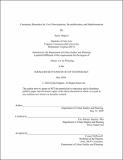| dc.contributor.advisor | Eric Robsky Huntley. | en_US |
| dc.contributor.author | Halpern, Dylan(Dylan Christopher) | en_US |
| dc.contributor.other | Massachusetts Institute of Technology. Department of Urban Studies and Planning. | en_US |
| dc.date.accessioned | 2020-09-15T22:05:28Z | |
| dc.date.available | 2020-09-15T22:05:28Z | |
| dc.date.copyright | 2020 | en_US |
| dc.date.issued | 2020 | en_US |
| dc.identifier.uri | https://hdl.handle.net/1721.1/127596 | |
| dc.description | Thesis: M.C.P., Massachusetts Institute of Technology, Department of Urban Studies and Planning, May, 2020 | en_US |
| dc.description | Cataloged from the official PDF of thesis. | en_US |
| dc.description | Includes bibliographical references (pages 89-93). | en_US |
| dc.description.abstract | Mis- and disinformation pose serious challenges to civic engagement and democratic processes. Recent developments in our understanding of "network propaganda" in media ecosystems suggest the need for novel community-based techniques with which to resist the negative impacts of mis- and disinformation. Civic engagement and civic life have long been central concerns of urban planning as a community of practice. The ability of broad publics to participate and engage is currently challenged by disorientation (confusion through overwhelming or contradictory messages), de-mobilization (persuasion to abstain from civic action), and malinformation (mis- or disinformation). This thesis confronts these urgent challenges in partnership with MassVote, a Boston-based non-profit that conducts civic engagement and education efforts. Through engaging high school interns participating in MassVote's Young Civic Leaders program, I developed a workshop framework to equip high school-aged youth to build online and create healthier relationships with news media. Informed by feminist epistemology, I identify opportunities for individuals and communities to remain grounded, oriented, and resilient in the context of a troubled media ecosystem. The workshop templates operate at three scales: individual/perception, community/small-scale network, and citizenry/society. Together, they create a suite of engagement strategies towards a framework of "network citizenship," or a more resolutely situated participation in social networks, both online and off. Keywords; Disinformation, misinformation, civic engagement, community resilience, bottom-up techniques, Strong Objectivity | en_US |
| dc.description.statementofresponsibility | by Dylan Halpern. | en_US |
| dc.format.extent | 93 pages | en_US |
| dc.language.iso | eng | en_US |
| dc.publisher | Massachusetts Institute of Technology | en_US |
| dc.rights | MIT theses may be protected by copyright. Please reuse MIT thesis content according to the MIT Libraries Permissions Policy, which is available through the URL provided. | en_US |
| dc.rights.uri | http://dspace.mit.edu/handle/1721.1/7582 | en_US |
| dc.subject | Urban Studies and Planning. | en_US |
| dc.title | Community remedies for civic disorientation, de-mobilization, and malinformation | en_US |
| dc.type | Thesis | en_US |
| dc.description.degree | M.C.P. | en_US |
| dc.contributor.department | Massachusetts Institute of Technology. Department of Urban Studies and Planning | en_US |
| dc.identifier.oclc | 1193556254 | en_US |
| dc.description.collection | M.C.P. Massachusetts Institute of Technology, Department of Urban Studies and Planning | en_US |
| dspace.imported | 2020-09-15T22:05:27Z | en_US |
| mit.thesis.degree | Master | en_US |
| mit.thesis.department | UrbStud | en_US |
